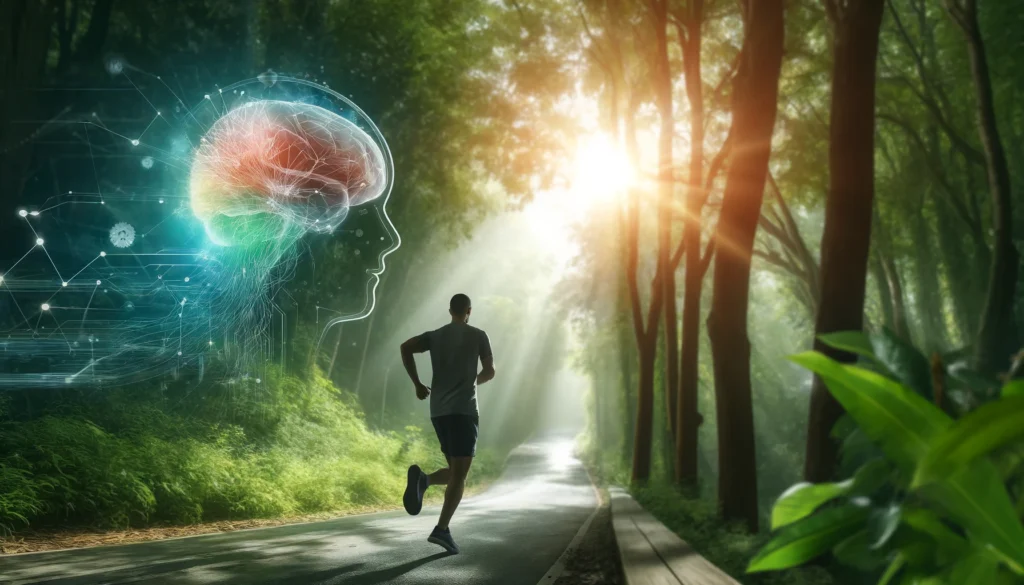In today’s fast-paced world, mental clarity is often elusive. Whether due to stress, lack of sleep, or nutritional deficiencies, brain fog can hinder productivity and quality of life. Fortunately, there are a number of strategies and products that can help alleviate this frustrating condition. This guide explores the top 10 items to combat brain fog, blending scientific insights with practical advice.
You May Also Like: Top Brain Health Product Brands Reviewed
Understanding Brain Fog
Before delving into solutions, it’s essential to understand what brain fog is. Often described as a feeling of mental cloudiness, brain fog is characterized by confusion, forgetfulness, and a lack of focus and mental clarity. It can result from various factors, including stress, sleep deprivation, poor diet, hormonal changes, and certain medical conditions.
Causes of Brain Fog
Brain fog can stem from multiple sources, making it crucial to identify the underlying cause. Stress and anxiety are common culprits that can cloud cognitive functions. Additionally, hormonal imbalances, such as those experienced during menopause or thyroid dysfunction, can contribute significantly to mental haziness. Environmental factors, including exposure to toxins, should also be considered.
Symptoms to Watch For
Recognizing brain fog involves looking out for specific symptoms. Individuals often experience persistent tiredness, difficulty concentrating, and forgetfulness. These symptoms can vary in intensity and may sometimes be accompanied by headaches or a general feeling of disorientation. Being aware of these signs can help in seeking timely interventions.
The Impact on Daily Life
The effects of brain fog extend beyond mere inconvenience, affecting daily productivity and overall well-being. In professional settings, it can lead to decreased efficiency and errors. Social interactions might also suffer, as individuals may struggle to follow conversations or remember details. Understanding these impacts underscores the importance of addressing brain fog promptly.

1. Omega-3 Fatty Acids
Omega-3 fatty acids, found in fish oil supplements, play a crucial role in brain health. They support cognitive function by reducing inflammation and promoting healthy neural membranes. Regular intake of omega-3s has been linked to improved memory and reduced symptoms of brain fog.
Historical Context and Current Trends
Historically, societies with diets rich in fish have shown lower rates of mental decline. Cultures such as the Inuit and Mediterranean populations, who consume high levels of omega-3s, have demonstrated better cognitive health into old age. Today, omega-3 supplements are widely recommended by health professionals as a brain-boosting measure.
Sources and Varieties
Omega-3 fatty acids come in various forms, including EPA, DHA, and ALA. While fish oil is the most popular supplement, other sources include flaxseeds, chia seeds, and walnuts. Understanding these different sources can help individuals tailor their intake based on dietary preferences or restrictions.
How to Incorporate Omega-3s
Incorporating omega-3s into your diet can be simple and effective. Aim to consume fatty fish such as salmon, mackerel, or sardines twice a week. For those preferring plant-based options, consider daily supplements or adding flaxseed oil to smoothies and salads. Consistency is key to reaping the cognitive benefits.
2. Adaptogenic Herbs
Adaptogens such as Rhodiola Rosea and Ashwagandha help the body adapt to stress, a common trigger of brain fog. By balancing cortisol levels, these herbs support mental clarity and focus.
Types of Adaptogens
Adaptogens come in various forms, each with unique properties. Rhodiola Rosea is known for its energy-boosting effects, while Ashwagandha is praised for its calming properties. Others like Holy Basil and Ginseng offer additional benefits, such as improved memory and reduced fatigue. Understanding these differences can guide personalized usage.
Practical Advice
Incorporate adaptogens into your daily routine through teas, capsules, or tinctures. Starting with a small dose and gradually increasing it allows the body to adjust. They are a natural remedy for brain fog and can be used alongside other treatments, but consulting with a healthcare provider is advisable, especially if taking other medications.
Research and Efficacy
Scientific interest in adaptogens is growing, with studies highlighting their potential in enhancing cognitive function and reducing stress. Clinical trials have shown promising results in improving mental performance and resilience. Continued research is likely to expand their role in mental health strategies.
3. Nootropic Supplements
Nootropics, or “smart drugs”, are substances that enhance cognitive function. Common nootropics like Bacopa Monnieri and Ginkgo Biloba have shown promise in improving attention, memory, and mental clarity.
Types and Effects
Nootropics range from natural substances like Bacopa Monnieri to synthetic compounds like Piracetam. Each type offers distinct cognitive benefits, from boosting memory to enhancing focus. Understanding these differences can help users select the most appropriate nootropic for their needs.
Future Implications
As research on nootropics expands, their role in treating brain fog and enhancing cognitive function continues to grow. With the increasing interest from biohackers and health enthusiasts, the market for nootropics is expected to diversify. Frequent exploration of new nootropic combinations is likely, aiming for optimal cognitive enhancement.
Safety and Usage
While nootropics offer potential benefits, safety is a crucial consideration. Starting with low doses and observing the body’s response can help mitigate potential side effects. Consulting with a healthcare professional before starting any nootropic regimen is recommended, particularly for those with pre-existing health conditions or who are pregnant.
4. Sleep Optimization
Sleep is fundamental to cognitive health. Without sufficient rest, the brain struggles to function efficiently, leading to fogginess. Prioritize quality sleep by maintaining a consistent sleep schedule and creating a restful environment.
The Science of Sleep
Understanding sleep cycles can enhance sleep quality. The body undergoes various stages, including REM and deep sleep, each contributing to cognitive function. Disruptions in these cycles, often caused by irregular sleep patterns, can exacerbate brain fog.
Creating a Sleep-Conducive Environment
Optimizing your sleep environment can significantly improve rest quality. Consider factors such as room temperature, noise levels, and bedding comfort. Limiting screen time before bed and introducing calming rituals like reading or warm baths can also promote better sleep.
Current Trends
Wearable technology that monitors sleep patterns is becoming increasingly popular. These devices offer insights that help individuals optimize their sleep for better mental clarity. By tracking sleep stages and disturbances, users can make informed adjustments to their routines for improved outcomes.
5. Hydration
Dehydration can significantly impact brain function, causing confusion and impaired focus. Ensuring adequate water intake is a simple yet effective strategy to combat brain fog.
Importance of Hydration
Water is vital for maintaining cognitive functions. It aids in nutrient transport and waste removal, ensuring brain cells operate efficiently. Even mild dehydration can lead to noticeable declines in mental performance, emphasizing the need for regular water intake.
Practical Advice
Aim to drink at least 8 glasses of water daily. Consider using a water tracking app to help maintain hydration levels. For those struggling with plain water, infusing it with fruits or herbs can make hydration more enjoyable while providing additional nutrients.
Signs of Dehydration
Recognizing dehydration early can prevent its cognitive effects. Common signs include dry mouth, fatigue, and dizziness. Paying attention to these symptoms can prompt timely hydration, reducing the risk of brain fog and enhancing overall well-being.

6. Mindfulness and Meditation
Mindfulness practices such as meditation reduce stress and improve focus, both of which are beneficial for overcoming brain fog. These practices encourage a state of mental clarity and relaxation.
Techniques and Practices
Mindfulness and meditation encompass various techniques, from guided sessions to breathing exercises. Each approach offers unique benefits, allowing individuals to select methods that best suit their lifestyle and preferences. Regular practice can enhance the mind’s resilience to stress.
Historical Context
Mindfulness and meditation have been practiced for centuries, with roots in ancient Eastern traditions. Initially integral to spiritual practices, their benefits for mental health are now widely recognized in the Western world. Modern adaptations have made these practices accessible to diverse audiences.
Integration into Daily Life
Incorporating mindfulness into daily routines doesn’t require significant time commitments. Short meditation sessions or mindful breathing exercises can be integrated into morning routines or work breaks. Consistency in practice can lead to lasting improvements in mental clarity and emotional balance.
7. Balanced Nutrition
A diet rich in fruits, vegetables, lean proteins, and whole grains supports overall brain health. Nutritional deficiencies, particularly in B vitamins and magnesium, can contribute to brain fog.
Nutrients Essential for Brain Health
Certain nutrients play a pivotal role in maintaining cognitive function. B vitamins are crucial for energy production, while magnesium supports nerve transmission. Including a variety of these nutrients in your diet can bolster brain health and reduce foggy symptoms.
Current Trends
Plant-based diets and clean eating are gaining traction as they provide essential nutrients that support cognitive function and reduce inflammation. These diets emphasize whole, minimally processed foods, aligning with contemporary health movements focused on longevity and vitality.
Meal Planning Tips
Planning balanced meals can simplify the integration of brain-boosting nutrients. Incorporate colorful vegetables, whole grains, and high-quality proteins into each meal. Preparing meals in advance can ensure nutrient-rich options are readily available, supporting consistent dietary habits.
8. Exercise
Regular physical activity boosts blood flow to the brain, enhancing cognitive function and reducing symptoms of brain fog. Exercise also promotes the release of endorphins, which can improve mood and mental clarity.
Benefits Beyond Physical Health
Exercise offers numerous cognitive benefits beyond physical fitness. Activities that elevate heart rate enhance oxygen and nutrient delivery to brain cells, supporting mental acuity. Additionally, exercise can reduce stress levels, further mitigating brain fog.
Practical Advice
Incorporate at least 30 minutes of moderate exercise into your daily routine. Activities such as walking, cycling, or yoga are effective options. For those with time constraints, high-intensity interval training (HIIT) can provide cognitive benefits in shorter durations.
Creating an Exercise Routine
Establishing a consistent exercise routine requires planning and commitment. Start by selecting activities you enjoy, making it easier to stick with them. Setting specific goals and tracking progress can also motivate continued engagement and improvement.
9. Vitamin D
Vitamin D is crucial for brain health, yet many people suffer from deficiencies, particularly in regions with limited sunlight. Supplementing with vitamin D can improve cognitive function and alleviate brain fog.
Sources of Vitamin D
Vitamin D can be obtained through sunlight exposure, certain foods, and supplements. Fatty fish, fortified dairy products, and egg yolks are dietary sources. Understanding these options can help individuals meet their vitamin D needs, particularly in low-sunlight conditions.
Future Implications
Ongoing research continues to reveal the importance of vitamin D in maintaining mental health, suggesting its potential role in preventing cognitive decline. As understanding deepens, vitamin D could become a more prominent component of brain health strategies.
Monitoring and Supplementation
Regular monitoring of vitamin D levels can guide supplementation needs. Blood tests can determine deficiency, allowing for tailored supplement dosages. Consulting with a healthcare provider ensures safe and effective vitamin D management.
10. Caffeine in Moderation
Caffeine, when consumed in moderation, can enhance alertness and concentration. Green tea, in particular, contains L-theanine, which works synergistically with caffeine to improve focus without the jittery effects.
Benefits and Considerations
Caffeine can provide a quick mental boost, enhancing alertness and reaction times. However, excessive consumption may lead to dependency or disrupt sleep patterns. Balancing caffeine intake is crucial for maximizing benefits while minimizing potential drawbacks.
Practical Advice
Opt for green tea or coffee in the morning, but avoid excessive consumption to prevent potential negative effects on sleep. Limiting intake to 400 mg per day, equivalent to about 4 cups of coffee, is generally considered safe for most adults.
Exploring Alternatives
For those sensitive to caffeine, alternatives like herbal teas or decaffeinated options can offer similar benefits without the stimulating effects. Exploring these options allows for flexibility in maintaining mental clarity and focus.

Conclusion
Brain fog can be a debilitating experience, but with the right approach, it’s manageable. By incorporating these items into your lifestyle, you can enhance mental clarity and overall cognitive health. As always, consult with a healthcare professional before starting any new supplement or treatment, particularly if you have underlying health conditions.
This comprehensive approach to combating brain fog blends historical wisdom with modern science, providing a roadmap to mental clarity and enhanced focus. Embracing these strategies can lead to significant improvements in daily productivity and quality of life.
Further Reading:
5 Supplements for Managing Brain Fog
What to know about anxiety and brain fog
What is COVID-19 brain fog — and how can you clear it?
Important Note: The information contained in this article is for general informational purposes only, and should not be construed as health or medical advice, nor is it intended to diagnose, prevent, treat, or cure any disease or health condition. Before embarking on any diet, fitness regimen, or program of nutritional supplementation, it is advisable to consult your healthcare professional in order to determine its safety and probable efficacy in terms of your individual state of health.
Regarding Nutritional Supplements Or Other Non-Prescription Health Products: If any nutritional supplements or other non-prescription health products are mentioned in the foregoing article, any claims or statements made about them have not been evaluated by the U.S. Food and Drug Administration, and such nutritional supplements or other health products are not intended to diagnose, treat, cure, or prevent any disease.


